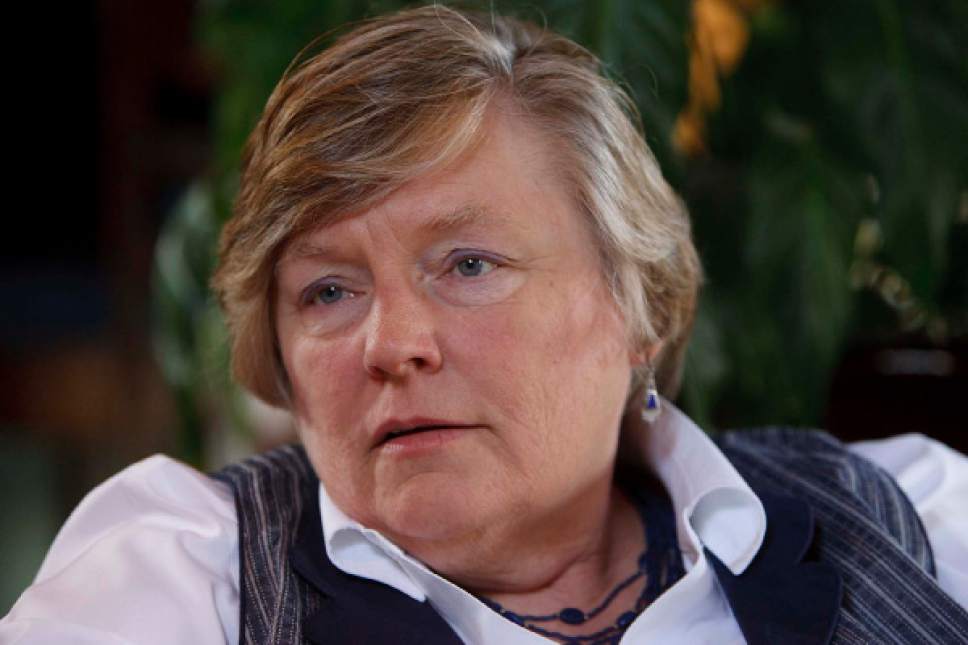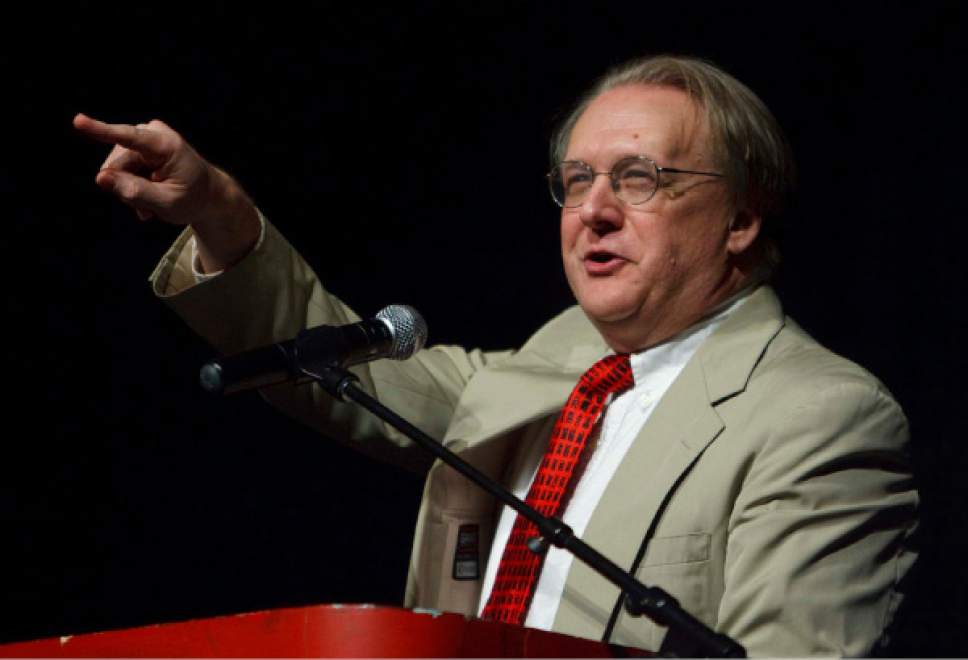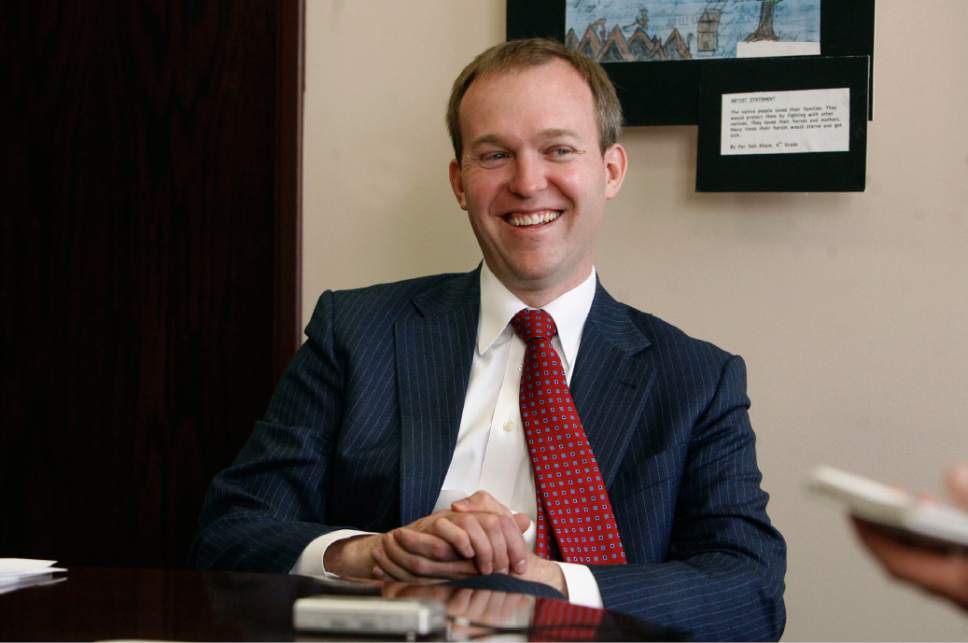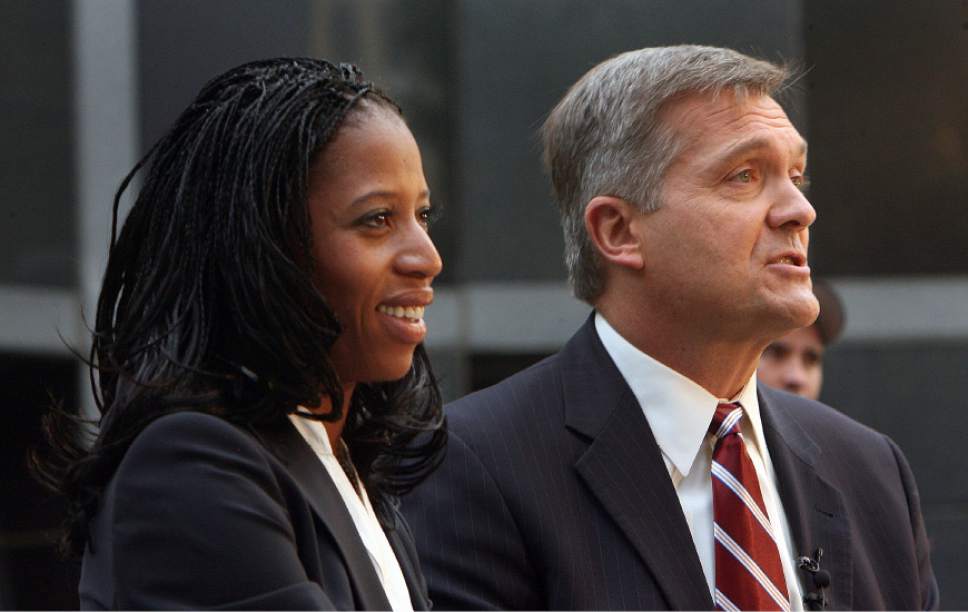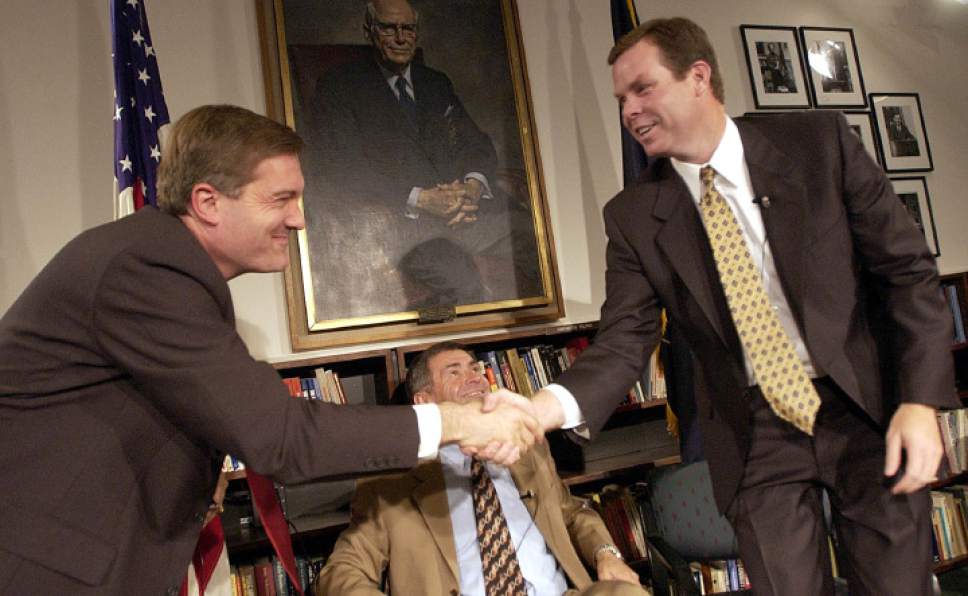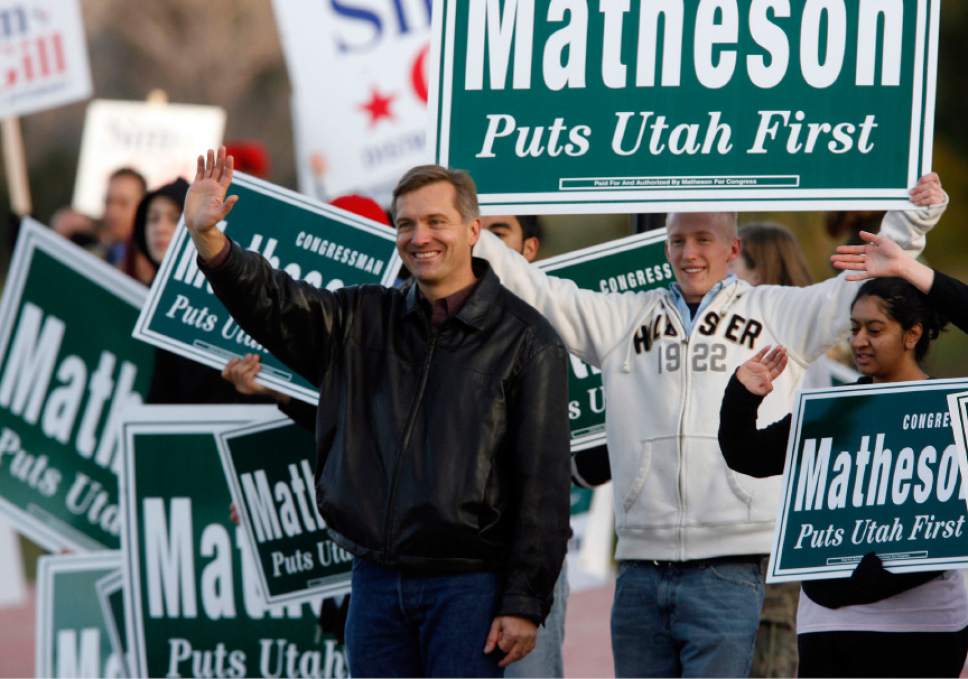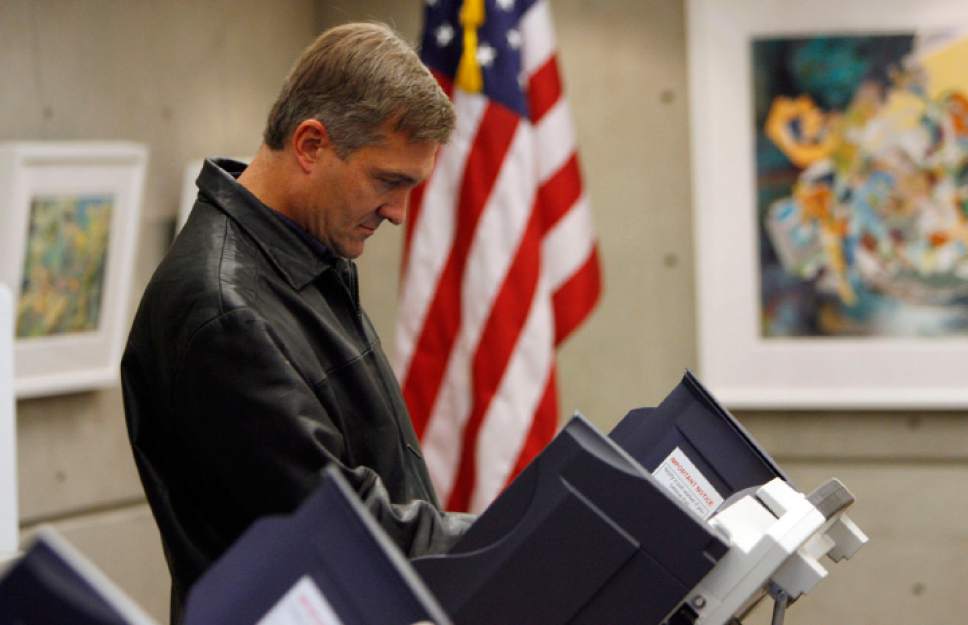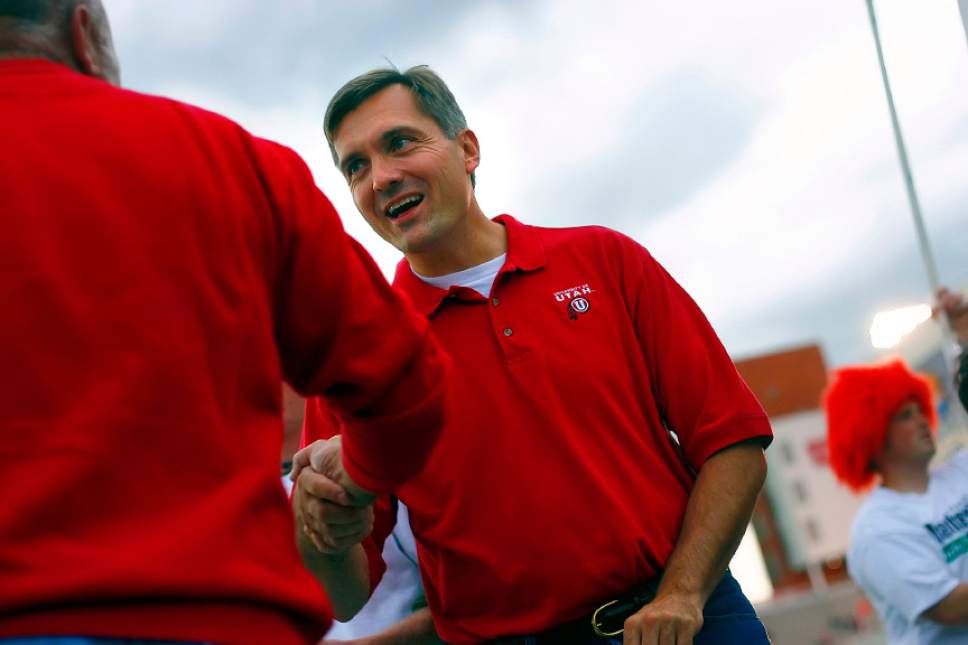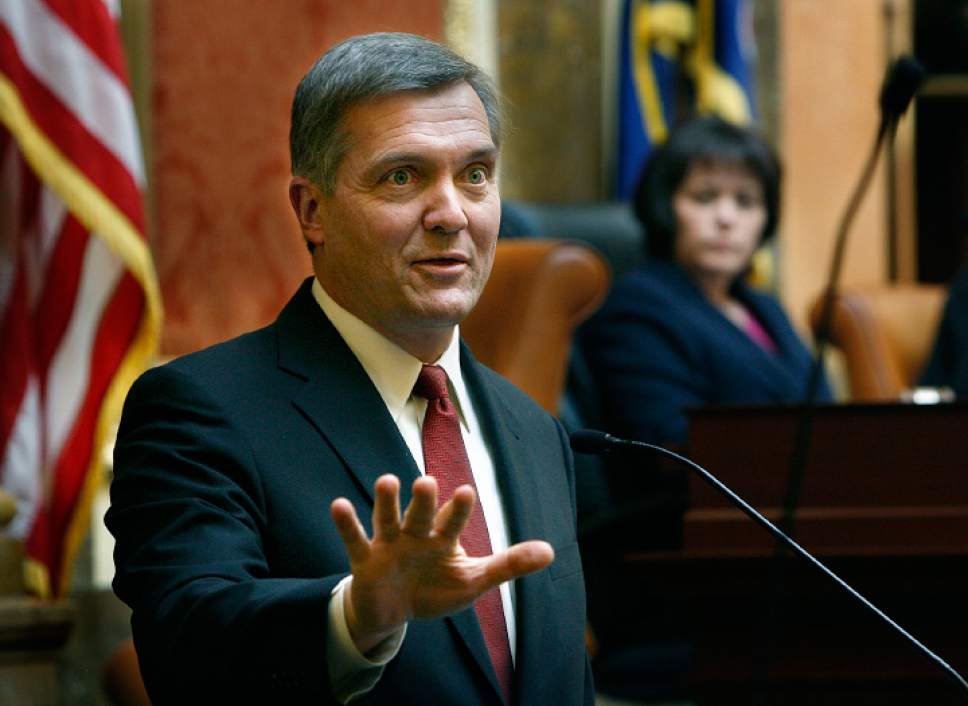This is an archived article that was published on sltrib.com in 2014, and information in the article may be outdated. It is provided only for personal research purposes and may not be reprinted.
Washington • On one of his last days in Congress, Rep. Jim Matheson holds court in the ornate Rayburn Room just off the House floor. His office is gone. His mementos stored or ready to ship. He's casting the final votes of his House career.
"I will miss looking up at the Capitol as I walk to work every day," Matheson says, sporting his trademark cowboy boots and looking at ease as he readies for a transition to life beyond Congress. "It's something that has always created an emotional response every day."
The Utah Democrat didn't run for re-election and isn't sure what his future may hold — possibly making a bid for governor or challenging Sen. Mike Lee. Other options are settling into a less-public role in the policy world.
One thing is for sure: Matheson has left behind a legacy that gives a glimmer of hope to Democrats in one of the reddest states in the nation. Through his painstaking (some on the left would say painful) efforts to steer to the middle, and his appeals to even ardent Republicans, he's carved out a path for the minority party in Utah to win. He did it seven times, even in the face of blatently partisan redistricting and all-out, big money efforts to cut short his time in office.
"I think he is a great role model for Democrats in Utah, and somebody I have tried to model my service after, a really sensible, even-handed voice that stands for what he believes in regardless of what party an idea may come from," says Salt Lake County Mayor Ben McAdams, a fellow Democrat who corralled bipartisan support in his 2012 election.
"Jim Matheson says of himself that he 'puts Utah first,' and I think in his 14 years in office that's been very clear. First above any political party, any turf or ideology. That's a great model not just for Democrats but anybody in public service."
Utah's majority party has kept Matheson hopping during his time in office, with each new campaign starting almost as soon as he wraps up his election-night victory speech. He's crossed party leaders, sided with Republicans and avoided the spotlight in partisan fights all the while ensuring constituent requests were a priority, local issues a main focus and bipartisanship a goal.
It hasn't been an easy gig for Matheson given Washington's continued slide into polarization.
—
A promise to voters • On a cold, wind-swept day in March 2000, Matheson stood in front of his boyhood home to announce his candidacy for office. He was taking on GOP Rep. Merrill Cook, whose prospects were dicey because of public temper tantrums and odd antics like firing his top staff immediately after winning re-election. Matheson promised to follow in the footsteps of his late father, two-term Gov. Scott Matheson.
"I'm a Matheson, and Matheson is more than a last name," the congressional hopeful declared to some 200 supporters. "It stands for integrity. It represents a reverence for public service and a commitment to a common-sense approach to issues. It means I will say what I believe, and not just what people want to hear."
Fourteen years later, Matheson remained as one of the few holdout moderates in Congress. National Journal rated him as the 199th most liberal House member, and the 232nd most conservative. That put him at nearly 53 percent liberal, and 47 percent conservative in a Congress so gridlocked it could barely pass a last-minute budget compromise, let alone long-term spending bills.
He's a member of the Blue Dog Democrats, a caucus that has been gutted by gerrymandering and retirements of folks who either knew they couldn't win or didn't have the stomach for the partisan gantlet.
Matheson is one who hasn't shied away from criticizing Washington, or his own party. He's voted against Nancy Pelosi twice for the party's House leader and notes that neither party is pure when it comes to its approach to governing.
"The motivation of people around here is sort of this tribal mentality, Us versus Them, D versus R and [that] 'We've got to be in power; We've got to be in control,'" Matheson says. "And that's not necessarily right for this country."
Liberals within the Democratic Party certainly haven't viewed Matheson as a member of the tribe. In 2010, after years of frustrating and angering the progressive wing of his party, he was forced into a primary with a little-known challenger, Claudia Wright. He easily won that showdown.
Former Salt Lake County Democratic Party Chairman Joe Hatch, an unabashed liberal, says he's never felt that only Democrats who line up with his ideals should get elected, but Matheson never ventured onto the left side of the political dial.
"I always wondered what he stood for," Hatch says. "I remember once saying, 'I just want one issue where he would take a difficult vote that was for me and on my side of the ledger.' "
That said, Hatch, a former county councilman, notes that Matheson was willing to work with both sides of the aisle to get things done.
"I do think he represented, not a new breed, but in reality the end of the breed of politician for both parties, and that is kind of the individual who can cross party lines and get things done by appealing to the center," Hatch says.
—
Always a target • Back in the Rayburn Room, a nearby clock buzzes five times and five indicators light up. A vote has been called, and Matheson jumps up for the short stroll to the floor. He leaves behind his well-worn voting card – an ID members use to cast ballots – and returns a minute later to snatch it off the table.
Like other members, his voting record has always been campaign fodder, though Matheson has carefully straddled the line on what he supports. He has on many occasions backed Democrats on procedural moves to block bills only to later vote for the underlying GOP legislation.
In the heat of the Affordable Care Act, the White House sought Matheson's support only to see him turn against the legislation. Two years later, Matheson joined fellow Democrats opposing a vote to repeal the law.
"Jim Matheson's newfound defense of his government takeover of healthcare after two long years of failure demonstrates just how out of touch he is with the families who are being forced off their health plans or seeing their premiums rise," the National Republican Congressional Committee's Paul Lindsay crowed in March 2012.
The NRCC has made Matheson a top target since he joined Congress in 2001. This and several outside groups, have poured millions into beating him, and a slew of contenders have tried to take him out: Derek Smith (Matheson won by 15 percentage points), John Swallow (Matheson squeaked by with a margin of less than 1 percent), Swallow, again (a 12-point victory for Matheson), LaVar Christensen (Matheson by 22 points), Bill Dew (Matheson by 28 points), Morgan Philpot (Matheson by 4 points), Mia Love (Matheson by less than 1 point).
In the latter race, Matheson was able to win despite his rival's backing by Republican presidential nominee Mitt Romney and a newly created district designed to give the GOP candidate a 14-point edge out of the gate.
Love began running again shortly after her loss, but Matheson pulled out in December 2013.
Originally, Matheson took his place in Congress from a district that was solely in Salt Lake County. Soon after, the GOP-dominated Utah Legislature carved up the 2nd District to cover part of his original seat but with a large swath of eastern and southern Utah. In 2011, the Legislature again retooled the district and Matheson jumped to the new 4th District, covering parts of Utah County and Republican areas in Salt Lake County – and he won.
He knows the odds he faced along the way, but credits his effort to distinguish himself from the stereotypical politician.
"If you look at the district[s] on paper, I should have lost these seven elections," Matheson says, in retrospect. "I believe the voters are looking for something other than party label. If they weren't, I never would have won."
Other Democrats have tried to follow Matheson's lead, including McAdams. Doug Owens, the son of the late Rep. Wayne Owens, borrowed Matheson's playbook in the last election but lost by four points to Love. He was outspent by more than five-to-one.
House Minority Whip Steny Hoyer tapped Matheson this session to serve as an assistant whip, charged with helping to round up votes from his colleagues. Hoyer says Matheson has, throughout his time in the House, been a voice for pragmatic solutions.
"He has worked in a thoughtful and considered way with colleagues on both sides of the aisle, and he has shown real leadership on issues like getting our nation back on a fiscally sustainable path," Hoyer said in a statement. "Jim has been the kind of legislator who knows how to get things done, and he has always put the well-being of his constituents and his country above all else."
Asked for his successes in Congress, Matheson points out that he has been known for helping constituents, to a point that residents of other districts have reached out to his office for help. He's also tallied a list of other achievements.
—
Accomplishments • Utahns may not recall the words Divine Strake, but not so long ago it was a big concern for those who recalled the fallout from the nation's aboveground nuclear testing in the 1950s and 60s. Underground tests continued through 1992, but then ceased until, in 2006, the Pentagon was planning to try out its new weapon in the Nevada Test Site that was expected to shoot a cloud 10,000 feet into the air and result in an earthquake.
Scant attention was paid until members of Congress, including Matheson, raised the alarm about what the non-nuclear explosive device could do if it were to be tested in southern Nevada. The Defense Threat Reduction Agency eventually canceled the test in 2007 after a public outcry.
"We killed that project, and that was a great example of holding government accountable," Matheson recalls.
The congressman also points to a compromise that allowed the building of St. George's new airport without lawsuits, his efforts to remove uranium tailings from the banks of the Colorado River near Moab and work to block foreign nuclear waste from being buried in Utah's west desert. He's also proud of the teamwork with then-Sen. Bob Bennett, R-Utah, to pass the Washington County Lands Bill, which brought developers, local officials and environmentalists together to divvy up areas for preservation or city expansion in the growing area.
He also recently passed legislation to help halt the proliferation of counterfeit pharmaceuticals.
Matheson's last vote in in the House was to allow the Interior Department to aquire a donation of 44 acres in Martinez, Calif. It's one of thousands of votes he's cast since coming to Washington in January 2001. It may not be his last.
—
Everything's on the table • Matheson says he's not trying to dodge the question. He really isn't sure what he wants to do as an ex-member of Congress.
"I want to be in the NFL but I don't have the arm strength," he jokes. "I want to be a quarterback."
When Matheson announced he wasn't going to run for an eighth term, he didn't hide the fact that he's still interested in running for another office. Possibly for governor or the Senate. But he's not showing his hand.
He's keeping his condo only a couple blocks away from the U.S. House office buildings, which he says is a good investment and that he may rent out in the near future. It isn't a sign, he insists, of what he plans to do.
Short term, Matheson says he intends to re-enter private life by working in the policy world to some degree. He doesn't rule out becoming a lobbyist, as he has been before, but it isn't something he's eyeing at the moment.
"Everything is on the table right now," he says.
In the meantime, fellow Utah Democrats lament the loss of their highest elected official but hope for his return.
"I hope that he's not done," says McAdams. "I hope we see future public service from Jim Matheson, and if he ever decides to jump back into the ring, I'll be there to support him."


